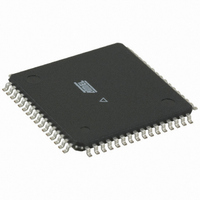ATMEGA649V-8AU Atmel, ATMEGA649V-8AU Datasheet - Page 108

ATMEGA649V-8AU
Manufacturer Part Number
ATMEGA649V-8AU
Description
IC AVR MCU FLASH 64K 64TQFP
Manufacturer
Atmel
Series
AVR® ATmegar
Specifications of ATMEGA649V-8AU
Core Processor
AVR
Core Size
8-Bit
Speed
8MHz
Connectivity
SPI, UART/USART, USI
Peripherals
Brown-out Detect/Reset, LCD, POR, PWM, WDT
Number Of I /o
53
Program Memory Size
64KB (32K x 16)
Program Memory Type
FLASH
Eeprom Size
2K x 8
Ram Size
4K x 8
Voltage - Supply (vcc/vdd)
1.8 V ~ 5.5 V
Data Converters
A/D 8x10b
Oscillator Type
Internal
Operating Temperature
-40°C ~ 85°C
Package / Case
64-TQFP, 64-VQFP
Processor Series
ATMEGA64x
Core
AVR8
Data Bus Width
8 bit
Data Ram Size
4 KB
Interface Type
SPI, USART, USI
Maximum Clock Frequency
8 MHz
Number Of Programmable I/os
54
Number Of Timers
3
Operating Supply Voltage
1.8 V to 5.5 V
Maximum Operating Temperature
+ 85 C
Mounting Style
SMD/SMT
Minimum Operating Temperature
- 40 C
On-chip Adc
10 bit, 8 Channel
Package
64TQFP
Device Core
AVR
Family Name
ATmega
Maximum Speed
8 MHz
Cpu Family
ATmega
Device Core Size
8b
Frequency (max)
8MHz
Total Internal Ram Size
4KB
# I/os (max)
54
Number Of Timers - General Purpose
3
Operating Supply Voltage (typ)
3.3/5V
Operating Supply Voltage (max)
5.5V
Operating Supply Voltage (min)
2.7V
Instruction Set Architecture
RISC
Operating Temp Range
-40C to 85C
Operating Temperature Classification
Industrial
Mounting
Surface Mount
Pin Count
64
Package Type
TQFP
For Use With
ATSTK600-TQFP64 - STK600 SOCKET/ADAPTER 64-TQFP770-1007 - ISP 4PORT ATMEL AVR MCU SPI/JTAG770-1005 - ISP 4PORT FOR ATMEL AVR MCU JTAG770-1004 - ISP 4PORT FOR ATMEL AVR MCU SPIATAVRISP2 - PROGRAMMER AVR IN SYSTEMATJTAGICE2 - AVR ON-CHIP D-BUG SYSTEM
Lead Free Status / RoHS Status
Lead free / RoHS Compliant
Available stocks
Company
Part Number
Manufacturer
Quantity
Price
- Current page: 108 of 392
- Download datasheet (7Mb)
15.1
15.1.1
108
Register Description
ATmega329/3290/649/6490
GTCCR – General Timer/Counter Control Register
Enabling and disabling of the clock input must be done when T1/T0 has been stable for at least
one system clock cycle, otherwise it is a risk that a false Timer/Counter clock pulse is generated.
Each half period of the external clock applied must be longer than one system clock cycle to
ensure correct sampling. The external clock must be guaranteed to have less than half the sys-
tem clock frequency (f
sampling, the maximum frequency of an external clock it can detect is half the sampling fre-
quency (Nyquist sampling theorem). However, due to variation of the system clock frequency
and duty cycle caused by Oscillator source (crystal, resonator, and capacitors) tolerances, it is
recommended that maximum frequency of an external clock source is less than f
An external clock source can not be prescaled.
Figure 15-2. Prescaler for Timer/Counter0 and Timer/Counter1
Note:
• Bit 7 – TSM: Timer/Counter Synchronization Mode
Writing the TSM bit to one activates the Timer/Counter Synchronization mode. In this mode, the
value that is written to the PSR2 and PSR10 bits is kept, hence keeping the corresponding pres-
caler reset signals asserted. This ensures that the corresponding Timer/Counters are halted and
can be configured to the same value without the risk of one of them advancing during configura-
tion. When the TSM bit is written to zero, the PSR2 and PSR10 bits are cleared by hardware,
and the Timer/Counters start counting simultaneously.
• Bit 0 – PSR10: Prescaler Reset Timer/Counter1 and Timer/Counter0
Bit
0x23 (0x43)
Read/Write
Initial Value
PSR10
clk
T0
T1
I/O
1. The synchronization logic on the input pins (
Synchronization
Synchronization
TSM
R/W
7
0
ExtClk
6
–
R
0
< f
clk_I/O
R
5
–
0
/2) given a 50/50% duty cycle. Since the edge detector uses
clk
Clear
T1
R
4
–
0
R
T1/T0)
3
–
0
is shown in
R
2
–
0
(1)
PSR2
R/W
1
0
Figure
PSR10
R/W
0
0
15-1.
clk
T0
clk_I/O
GTCCR
2552K–AVR–04/11
/2.5.
Related parts for ATMEGA649V-8AU
Image
Part Number
Description
Manufacturer
Datasheet
Request
R

Part Number:
Description:
Manufacturer:
Atmel Corporation
Datasheet:

Part Number:
Description:
IC AVR MCU FLASH 64K 64-QFN
Manufacturer:
Atmel
Datasheet:

Part Number:
Description:
IC AVR MCU FLASH 64K 64TQFP
Manufacturer:
Atmel
Datasheet:

Part Number:
Description:
IC AVR MCU FLASH 64K 5V 64TQFP
Manufacturer:
Atmel
Datasheet:

Part Number:
Description:
IC AVR MCU FLASH 64K 5V 64QFN
Manufacturer:
Atmel
Datasheet:

Part Number:
Description:
MCU AVR 64KB FLASH 16MHZ 64QFN
Manufacturer:
Atmel
Datasheet:

Part Number:
Description:
IC MCU AVR FLASH 64K 64TQFP
Manufacturer:
Atmel
Datasheet:

Part Number:
Description:
Manufacturer:
Atmel Corporation
Datasheet:

Part Number:
Description:
Manufacturer:
ATMEL Corporation
Datasheet:

Part Number:
Description:
Manufacturer:
ATMEL Corporation
Datasheet:

Part Number:
Description:
IC AVR MCU 64K 16MHZ 5V 64TQFP
Manufacturer:
Atmel
Datasheet:

Part Number:
Description:
IC AVR MCU 64K 16MHZ 5V 64-QFN
Manufacturer:
Atmel
Datasheet:

Part Number:
Description:
IC AVR MCU 64K 16MHZ COM 64-TQFP
Manufacturer:
Atmel
Datasheet:

Part Number:
Description:
IC AVR MCU 64K 16MHZ IND 64-TQFP
Manufacturer:
Atmel
Datasheet:

Part Number:
Description:
IC AVR MCU 64K 16MHZ COM 64-QFN
Manufacturer:
Atmel
Datasheet:











